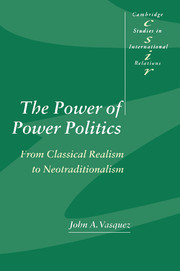Book contents
- Frontmatter
- Contents
- List of figures
- List of tables
- Preface
- Introduction
- Part I The Original Text: Classical Realism and Quantitative International Politics
- Preface to Part I
- Acknowledgments
- 1 The role of paradigms in scientific inquiry: a conceptual framework and a set of principles for paradigm evaluation
- 2 The role of the realist paradigm in the development of a scientific study of international relations
- 3 Research design: defining and operationalizing the realist paradigm
- 4 Theory construction as a paradigm-directed activity
- 5 Data making as a paradigm-directed activity
- 6 Research as a paradigm-directed activity
- 7 Evaluation: the adequacy of the realist paradigm
- 8 Theory and research in the 1970s: the emerging anomalies
- Part II Neorealism and Neotraditionalism: International Relations Theory at the Millennium
- References
- Name index
- Subject index
- CAMBRIDGE STUDIES IN INTERNATIONAL RELATIONS
7 - Evaluation: the adequacy of the realist paradigm
Published online by Cambridge University Press: 22 September 2009
- Frontmatter
- Contents
- List of figures
- List of tables
- Preface
- Introduction
- Part I The Original Text: Classical Realism and Quantitative International Politics
- Preface to Part I
- Acknowledgments
- 1 The role of paradigms in scientific inquiry: a conceptual framework and a set of principles for paradigm evaluation
- 2 The role of the realist paradigm in the development of a scientific study of international relations
- 3 Research design: defining and operationalizing the realist paradigm
- 4 Theory construction as a paradigm-directed activity
- 5 Data making as a paradigm-directed activity
- 6 Research as a paradigm-directed activity
- 7 Evaluation: the adequacy of the realist paradigm
- 8 Theory and research in the 1970s: the emerging anomalies
- Part II Neorealism and Neotraditionalism: International Relations Theory at the Millennium
- References
- Name index
- Subject index
- CAMBRIDGE STUDIES IN INTERNATIONAL RELATIONS
Summary
This book opened with the claims that the realist paradigm has dominated the field since the early 1950s and that the realist paradigm has not been very effective in explaining behavior. Through a review of the literature and the use of quantitative techniques, it has been found that the realist paradigm has indeed been the major guiding force directing scholarly inquiry in each of the three major scientific activities of theory construction, data making, and research. These findings support the first claim and the interpretation of the field provided in chapter 2. The findings also lend credence to the general interpretation of all scientific work provided by Thomas Kuhn (1970a). However, the findings do not indicate whether the power of the realist paradigm to dominate the field has been beneficial for attaining the purpose of the field – the creation of knowledge. The second claim maintains that up to this time the realist paradigm has not been very beneficial, because it has failed to demonstrate any significant ability to pass tests. The present chapter will attempt to establish the validity of this claim.
The chapter is divided into five sections. The first specifies three criteria – accuracy, centrality, and scientific importance – that can be used to evaluate the adequacy of any paradigm. The second, third, and fourth sections operationally define each of the criteria respectively and apply them in an empirical “test” to determine the adequacy of the realist paradigm.
- Type
- Chapter
- Information
- The Power of Power PoliticsFrom Classical Realism to Neotraditionalism, pp. 121 - 153Publisher: Cambridge University PressPrint publication year: 1999

